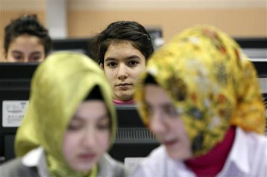Turkey’s Journey from Secularism to Islamization: A Capitalist Story
By Halil Karaveli
May 13, 2016
The dynamics of capitalist development have played a much more central role for Turkey’s journey from secularism to religious conservatism – and before that for the Kemalist break with Islam – than what is generally recognized. During the context of the Cold War, capitalist development and Islamization went hand in hand, as religious conservatism neutralized the challenge of the left and labor. Today, neoliberal globalization provides impetus for Islamization. Raising “pious generations” – who are “traditional,” not rebellious – is essential for sustaining neo-liberalism. An explicitly “religious” constitution, in which reference is made to God, will serve to mask that it is capital that reigns supreme. Ultimately, the survival of secularism requires that the economic order that depends on continued Islamization is called into question.
The Rise of Diyanet: the Politicization of Turkey’s Directorate of Religious Affairs
By Svante Cornell
October 9th, 2015, The Turkey Analyst
Since 2010, the State Directorate for Religious Affairs has risen in prominence. Diyanet’s budget has quadrupled under the AKP, and the Directorate now issues fatwas on demand, as well as wading into political issues and backing up the AKP position. Moreover, Diyanet has drastically increased its provision of Quran courses for students of all ages. The Diyanet, originally created by the Turkish state to exercise oversight over religious affairs, is now firmly under the control of President Erdoğan, and has turned into a supersized government bureaucracy for the promotion of Sunni Islam.
Bulaç: it is wrong to attack ISIS
Ali Bulaç in Zaman asks what Turkey stands to gain from joining the United States in its war against the terrorist group that calls itself the Islamic State (ISIS). Turkey will gain nothing! Let us imagine that northern Syria is cleared from ISIS. What is the U.S. going to deploy there in its place? It is of course not going to hand the place to al-Nusra, the Muslim Brotherhood or any other Islamic organization. It is very clear that Kurdish PYD is going to be deployed in the place of ISIS. And does not the PYD equal the PKK? The war against ISIS is not only fought against an organization, but it is a war against a Sunni Arab population that Turkey has committed itself to fight alongside and for the sake of the West! No one is approving what ISIS is doing. If ISIS is harming Islam and the Muslims, then the way to stop this is not to shoulder the role of the gendarme of the U.S. There are other ways to do it, in accordance with the codes and dynamics of the region. But there is right now no reasonable ground for declaring war against IS. The massacre in Suruç, that the ISIS has not taken responsibility for, is a very murky operation! ISIS has established authority over an area which is inhabited by millions of Muslims. That Turkey wageals war against a Muslim population represents a first in the history of the Republic. This has no Islamic legitimacy, and it is politically and militarily wrong.
The Islamization of Turkey: Erdoğan’s Education Reforms
By Svante E. Cornell (vol. 8, no. 16 of the Turkey Analyst)
The growing efforts at Islamization of Turkish society have largely gone unnoticed. For many years, Islamization was the dog that did not bark: in spite of dire predictions by secularists, the AKP did not introduce conspicuous efforts to Islamize Turkey. But since 2011, this has changed. The main exhibit is the education sector, which President Recep Tayyip Erdoğan has remodeled to instill considerably more Islamic content, in line with his stated purpose to raise “pious generations”. Ultimately, the Islamic overhaul of the education system is bound to have implications for Turkey’s civilizational identity, and on the choices it will make on where it belongs politically.





